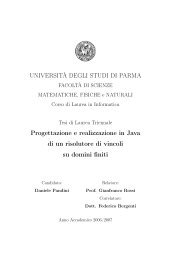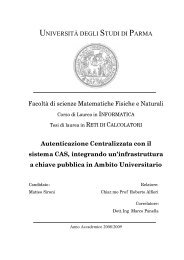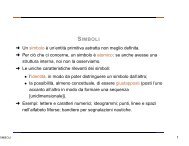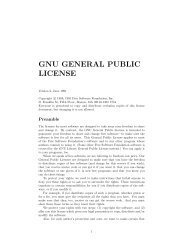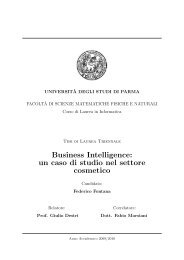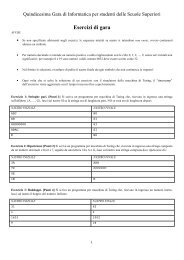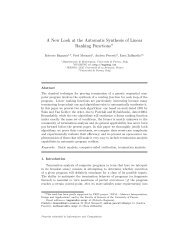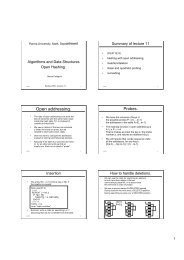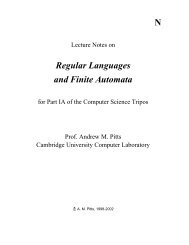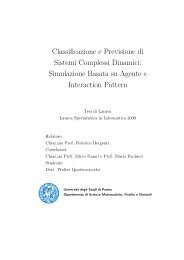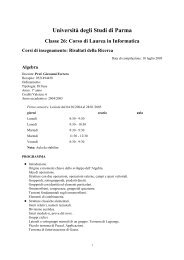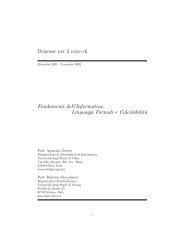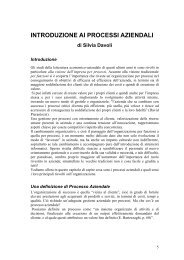a modern C++ library for the manipulation of Boolean functions
a modern C++ library for the manipulation of Boolean functions
a modern C++ library for the manipulation of Boolean functions
You also want an ePaper? Increase the reach of your titles
YUMPU automatically turns print PDFs into web optimized ePapers that Google loves.
4.1.2 Implementation policies<br />
The New_<strong>Boolean</strong>_Expression class supports many different internal representations<br />
<strong>for</strong> <strong>Boolean</strong> <strong>functions</strong>:<br />
The in<strong>for</strong>mation on entailed variables may be stored in <strong>the</strong> ROBDD or kept separate.<br />
The in<strong>for</strong>mation on disentailed variables may be stored in <strong>the</strong> ROBDD or kept separate.<br />
The in<strong>for</strong>mation on equivalent variables may be stored in <strong>the</strong> ROBDD or kept separate.<br />
Given <strong>the</strong> fact that some algorithms can be optimized when per<strong>for</strong>med on positive<br />
<strong>Boolean</strong> <strong>functions</strong>, we also support <strong>the</strong> option <strong>of</strong> representing only positive <strong>functions</strong> so<br />
that <strong>the</strong> optimized algorithms can be used. Finally, we give <strong>the</strong> option to let CORAL<br />
keep <strong>the</strong> internal representation normalized automatically or to let <strong>the</strong> user do it when<br />
he desires. The class interface should be <strong>the</strong> same <strong>for</strong> all cases.<br />
The trivial implementation would be to use 2 5 different classes. This <strong>of</strong> course is<br />
unacceptable <strong>for</strong> three main reasons: it would be extremely unelegant, <strong>the</strong> ef<strong>for</strong>t required<br />
to keep <strong>the</strong>ir interfaces coherent would be too big and it would be extremely hard to<br />
expand <strong>the</strong> <strong>library</strong> to provide new options in <strong>the</strong> future, as <strong>the</strong> number <strong>of</strong> classes would<br />
grow exponentially in <strong>the</strong> number <strong>of</strong> options. Our solution is to apply policy-based class<br />
design to New_<strong>Boolean</strong>_Expression: <strong>the</strong> implementation options are specified by small<br />
policy classes that contain only five static bool data members:<br />
explicit_entailed_vars is true if we represent entailed variables explicitly.<br />
explicit_disentailed_vars is true if we represent disentailed variables explicitly.<br />
explicit_equivalent_vars is true if we represent equivalent variables explicitly.<br />
lazy_normalization is true if we let <strong>the</strong> user normalize <strong>the</strong> internal representation<br />
manually.<br />
positive_<strong>functions</strong>_only is true if we represent only positive <strong>functions</strong> and apply <strong>the</strong><br />
optimized algorithms <strong>for</strong> <strong>the</strong>m.<br />
Listing 4.1 shows <strong>the</strong> implementation policy which represents only positive <strong>functions</strong><br />
by keeping <strong>the</strong> in<strong>for</strong>mation on entailed and equivalent variables separate (but not on<br />
disentailed variables) and utilizes automatic normalization.<br />
New_<strong>Boolean</strong>_Expression is a templatic class that takes an implementation policy<br />
type Policy as its template argument and is also derived from its template argument<br />
type. This allows its methods to adopt different behaviors depending on <strong>the</strong> chosen policy<br />
by checking <strong>the</strong> values <strong>of</strong> its static members. This solution is shown in Listing 4.2 along<br />
with <strong>the</strong> trick that is used in order to have different data members according to <strong>the</strong><br />
chosen internal representation, which consists <strong>of</strong> using arrays whose lengths can be 0<br />
or 1 depending on <strong>the</strong> values <strong>of</strong> <strong>the</strong> static policy members. The listing also shows <strong>the</strong><br />
private <strong>Boolean</strong> data member normalized that is used to record whe<strong>the</strong>r <strong>the</strong> internal<br />
representation has already been normalized or not so that we can avoid some unnecessary<br />
normalizations.<br />
4.1 Composite representations <strong>of</strong> <strong>Boolean</strong> <strong>functions</strong> 35



